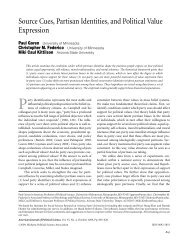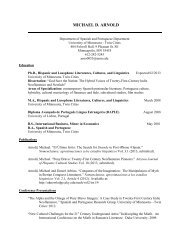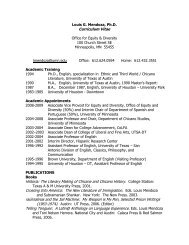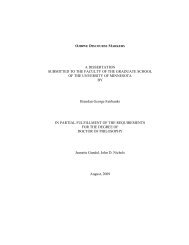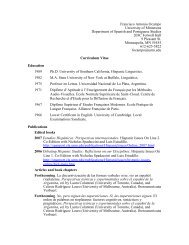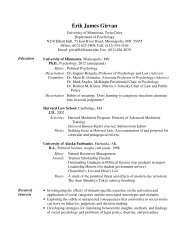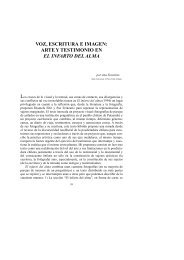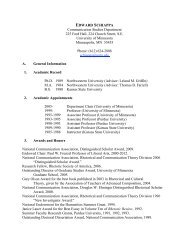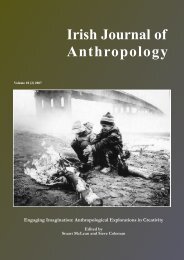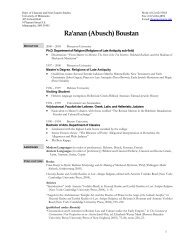De/Re-Constructing Borders - University of Minnesota
De/Re-Constructing Borders - University of Minnesota
De/Re-Constructing Borders - University of Minnesota
Create successful ePaper yourself
Turn your PDF publications into a flip-book with our unique Google optimized e-Paper software.
Africa, to bring civilization to a dark and unruly world. This civilization is a patriarchal,<br />
heavily Calvinist, racist one. With God on their side, the early Dutch and French settlers<br />
claimed the land as their own and land became an essential part <strong>of</strong> their cultural identity.<br />
By focusing on this central element <strong>of</strong> Afrikaner mythology, Opperman calls attention to<br />
the colonial legacy <strong>of</strong> his people. 6 The play echoes with land references: in its title; in the<br />
site <strong>of</strong> the play; and its the constant battles by each <strong>of</strong> the characters to claim or detach<br />
themselves from it.<br />
The play begins as the patriarch, Pieter de Witt, plants his land claim marker in the<br />
mid 18th century; it ends with the contemporary Land <strong>Re</strong>appropriation Act. As Pieter<br />
claims Donkerland, he sets into motion the long struggle that characterizes the narrative <strong>of</strong><br />
Afrikaner history and becomes the subject <strong>of</strong> this play. In Scene Two, Pieter marries<br />
Magriet and the couple establish themselves on Donkerland in a spartan cottage furnished<br />
with the familiar trappings <strong>of</strong> Voortrekker, or pioneer, life: a limestone fireplace,<br />
springbok-skin floor mats, a musket, and strips <strong>of</strong> dried beef biltong hanging along the<br />
ceiling. Called away to fight the Zulus, Pieter leaves his pregnant wife at the homestead,<br />
under the care <strong>of</strong> his Zulu maid and sexual consort, Meidjie. Rivalry between white<br />
mistress and black servant, between sexual competitors for the same man, predominates<br />
the scene. Magriet feels alienated when her husband speaks to Meidjie in Zulu. She<br />
demands that he not do this and requires that Meidjie learn to speak Afrikaans. Before<br />
leaving, Pieter gathers the women around the table and <strong>of</strong>fers a farewell prayer from the<br />
oversized family Bible. Then he kisses his unborn child in Magriet’s belly and says, “My<br />
son...Jacob de Witt...after his grandfather ” (25).<br />
During his absence, Magriet goes into labor but the baby is breached. A neighbor<br />
woman attempts to help her behind an ox skin that separates the bedroom upstage, while<br />
Meidjie frantically carries buckets <strong>of</strong> water to aid her. Meidjie tries repeatedly to tell the<br />
white woman––in Zulu, in broken Afrikaans, with gestures––that she knows how to turn<br />
the baby but the neighbor barks back at her, “Stand back! Don’t you dare try your<br />
barbarian practices on her....This isn’t your kaffir kraal; this is a white man’s house!” (31).<br />
Pieter arrives as his wife is dying, and under Meidjie’s guidance, tries to save her. In the<br />
3



